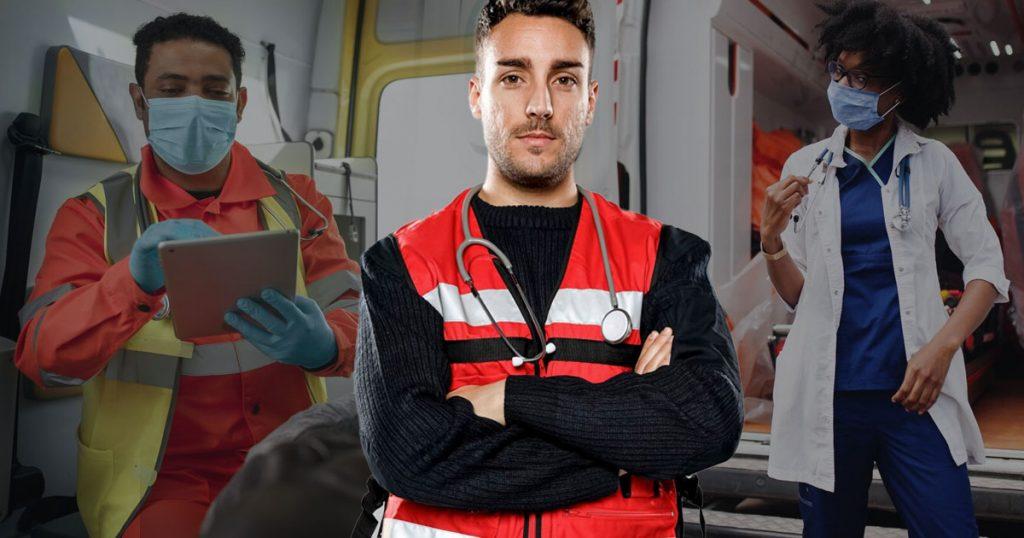In emergencies, having someone who knows basic first aid can truly save lives. These individuals are often seen as heroes because their skills, while fundamental, can make all the difference until professional help arrives. First aid knowledge not only impacts those in need but also enriches the lives of those who are able to provide it. A study shows that people with first aid training are more likely to focus on safety and health, both for themselves and those around them.
When we think about emergency responders, two important roles come to mind: Emergency Medical Technicians (EMTs) and paramedics. Both are essential in providing urgent care during emergencies, but they have different skills and responsibilities.
What is an EMT?
An EMT, which stands for Emergency Medical Technician, is a person trained to provide basic medical help in emergencies. EMTs are often among the first to arrive at the scene of an accident or medical crisis. Their job is to assess the situation, provide initial treatment, and transport patients to hospitals if needed.
EMTs handle tasks like performing CPR, stopping bleeding, and giving oxygen. They also use medical equipment and keep records of the care they provide. Important skills for EMTs include:
- Quick decision-making
- Physical strength and stamina
- Good communication skills
What is a Paramedic?
A paramedic is a healthcare worker who has more advanced training than an EMT. Paramedics can perform more complicated medical procedures, such as giving medications, reading heart monitors, and even doing minor surgeries like inserting breathing tubes.
Paramedics provide advanced care in emergencies, helping manage serious medical issues until the patient reaches the hospital. They are crucial team members during crises. Important skills for paramedics include:
- Advanced medical knowledge
- Ability to work well under pressure
- Leadership and guidance skills
Comparing EMTs and Paramedics
EMTs and paramedics are both vital in emergency medical services, but they have different roles and expertise:
Training
EMTs usually complete about 120-150 hours of training, focusing on basic emergency care like CPR and first aid. Paramedics undergo much more training, typically 1,200 to 1,800 hours. This extensive training includes advanced medical procedures and prepares them for a wider range of situations.
Responsibilities
EMTs handle basic tasks such as performing CPR, controlling bleeding, and transporting patients. Paramedics take on more complex duties, like giving medications, performing intubations, and reading heart monitors, allowing them to manage severe medical emergencies.
Skills
EMTs need to be good at basic life support techniques and using standard emergency gear. Paramedics have advanced skills, including administering drugs and doing minor surgical procedures, which are crucial in handling serious conditions.
Scope of Practice
EMTs provide basic care and stabilization at the scene and during transport to the hospital. Paramedics, with their advanced training, offer more comprehensive care, including advanced interventions for critical conditions before reaching the hospital.
Decision-Making
EMTs follow strict protocols for common emergencies, ensuring consistent care. Paramedics have the authority to make critical decisions on the spot, which can be crucial in rapidly changing situations.
Equipment Usage
EMTs use basic medical tools needed for initial care. Paramedics are trained to operate complex devices like defibrillators and advanced airway management tools, essential for life-saving procedures.
Salary Differences Between EMTs and Paramedics
When choosing between a career as an EMT or paramedic, it’s important to know how their salaries differ. Paramedics generally earn more than EMTs because of their advanced training and the more complex tasks they handle. Here’s a simple breakdown of what affects their pay:
Location
Where you work matters. In big cities or areas with a high cost of living, salaries tend to be higher. This is because these places need to offer more money to attract skilled workers. On the other hand, rural areas might pay less due to limited budgets.
Experience
Just like many jobs, more experience can lead to better pay. EMTs and paramedics who have been in the field for many years or have special skills usually earn more than newcomers.
Type of Employer
Different employers pay differently. For example, government jobs, hospitals, and private ambulance companies might have varied salary scales. Paramedics working in hospitals might earn more than those in private ambulance services because hospital positions can demand more duties and offer bigger budgets.
As for the numbers, EMTs typically make between $25,000 and $40,000 a year, depending on where they work and their experience. Paramedics, with their additional training, usually earn between $35,000 and $60,000 annually. In some high-demand areas or with extra certifications, paramedics can make even more.
The Impact and Rewards Beyond Salary
Working as an EMT or paramedic offers much more than just a paycheck. These careers bring personal satisfaction because they involve helping save lives and making a real difference in emergencies. Many find it rewarding to know their actions can change the outcome for someone in need. Besides personal fulfillment, there’s a chance to learn and grow professionally. EMTs and paramedics can pursue further training and certifications to enhance their skills and advance their careers.
On a broader scale, these roles are crucial for society by ensuring public safety and health. They provide quick medical help that can prevent minor issues from becoming serious, supporting the overall well-being of communities. Knowing that they are part of a team that keeps people safe and healthy gives them a sense of purpose and connection to their community, making this work much more than just a job.
